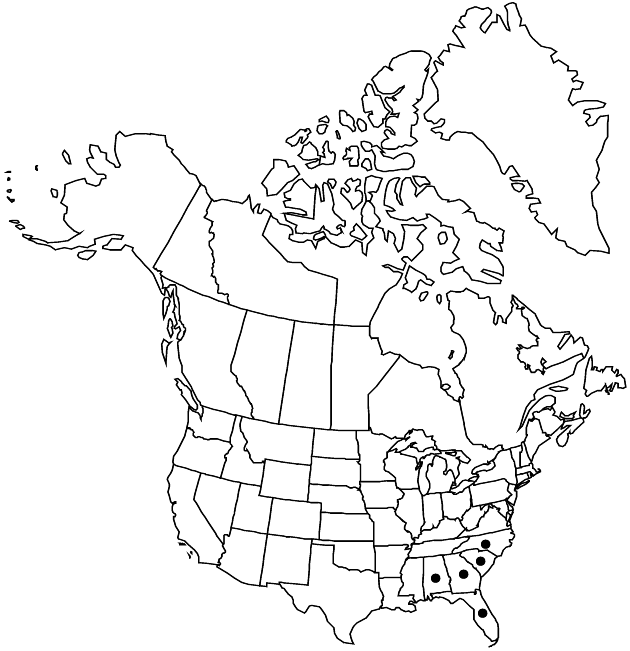Difference between revisions of "Gamochaeta simplicicaulis"
Bol. Soc. Argent. Bot. 9: 379. 1961.
FNA>Volume Importer |
imported>Volume Importer |
||
| (5 intermediate revisions by 2 users not shown) | |||
| Line 8: | Line 8: | ||
}} | }} | ||
|common_names=Simple-stem cudweed | |common_names=Simple-stem cudweed | ||
| − | |basionyms={{Treatment/ID/ | + | |special_status={{Treatment/ID/Special_status |
| + | |code=I | ||
| + | |label=Introduced | ||
| + | }} | ||
| + | |basionyms={{Treatment/ID/Basionym | ||
|name=Gnaphalium simplicicaule | |name=Gnaphalium simplicicaule | ||
|authority=Willdenow ex Sprengel | |authority=Willdenow ex Sprengel | ||
| + | |rank=species | ||
| + | |publication_title=Syst. Veg. | ||
| + | |publication_place=3: 481. 1826 | ||
}} | }} | ||
|synonyms={{Treatment/ID/Synonym | |synonyms={{Treatment/ID/Synonym | ||
|name=Gnaphalium purpureum var. simplicicaule | |name=Gnaphalium purpureum var. simplicicaule | ||
|authority=(Willdenow ex Sprengel) Klatt | |authority=(Willdenow ex Sprengel) Klatt | ||
| + | |rank=variety | ||
}} | }} | ||
|hierarchy=Asteraceae;Asteraceae tribe Gnaphalieae;Gamochaeta;Gamochaeta simplicicaulis | |hierarchy=Asteraceae;Asteraceae tribe Gnaphalieae;Gamochaeta;Gamochaeta simplicicaulis | ||
| Line 30: | Line 38: | ||
|elevation=0–10 m | |elevation=0–10 m | ||
|distribution=Ala.;Fla.;Ga.;N.C.;S.C.;South America;naturalized in New Zealand;Australia;Java. | |distribution=Ala.;Fla.;Ga.;N.C.;S.C.;South America;naturalized in New Zealand;Australia;Java. | ||
| + | |introduced=true | ||
|discussion=<p><i>Gamochaeta simplicicaulis</i> was reported from North America by G. L. Nesom (1999b, 2000b) as an apparently recent adventive.</p> | |discussion=<p><i>Gamochaeta simplicicaulis</i> was reported from North America by G. L. Nesom (1999b, 2000b) as an apparently recent adventive.</p> | ||
|tables= | |tables= | ||
| Line 39: | Line 48: | ||
-->{{#Taxon: | -->{{#Taxon: | ||
name=Gamochaeta simplicicaulis | name=Gamochaeta simplicicaulis | ||
| − | |||
|authority=(Willdenow ex Sprengel) Cabrera | |authority=(Willdenow ex Sprengel) Cabrera | ||
|rank=species | |rank=species | ||
| Line 54: | Line 62: | ||
|publication title=Bol. Soc. Argent. Bot. | |publication title=Bol. Soc. Argent. Bot. | ||
|publication year=1961 | |publication year=1961 | ||
| − | |special status= | + | |special status=Introduced |
| − | |source xml=https:// | + | |source xml=https://bitbucket.org/aafc-mbb/fna-data-curation/src/2e0870ddd59836b60bcf96646a41e87ea5a5943a/coarse_grained_fna_xml/V19-20-21/V19_714.xml |
|tribe=Asteraceae tribe Gnaphalieae | |tribe=Asteraceae tribe Gnaphalieae | ||
|genus=Gamochaeta | |genus=Gamochaeta | ||
Latest revision as of 19:54, 5 November 2020
Annuals or biennials, (30–)50–85 cm; fibrous-rooted. Stems erect or ascending (usually 1, sometimes 2–5), densely and closely white-pannose. Leaves basal and cauline, basal usually withering before flowering, blades oblanceolate to oblanceolate-spatulate, 5–9 cm × 6–18 mm (gradually smaller distally, margins closely undulate, nearly crenulate; distal cauline linear-lanceolate to linear-oblanceolate, apices long-acute; sessile clusters of smaller leaves produced in axils of mid and distal cauline leaves), faces bicolor, abaxial closely white-pannose, adaxial glabrous (shiny). Heads in interrupted, spiciform arrays (8–)16–30 cm × 10–14 mm (pressed; sometimes with ascending, lateral branches, glomerules usually subtended by ± patent linear bracts longer than the glomerules). Involucres cylindro-campanulate, 3–3.5 mm, bases glabrous. Phyllaries in 4–6 series, outer ovate to oblong, lengths 1/3–1/2 inner, apices acute-acuminate, inner narrowly oblong, laminae brownish to tan (not purplish), apices acuminate-apiculate. Florets: bisexual (2–)3; all corollas yellowish distally. Cypselae (tan) 0.5–0.6 mm.
Phenology: Flowering (Jun–)Jul–Aug(–Oct).
Habitat: Open sites, sandy soil, roadsides, fields, open woods, dunes
Elevation: 0–10 m
Distribution

Introduced; Ala., Fla., Ga., N.C., S.C., South America, naturalized in New Zealand, Australia, Java.
Discussion
Gamochaeta simplicicaulis was reported from North America by G. L. Nesom (1999b, 2000b) as an apparently recent adventive.
Selected References
None.